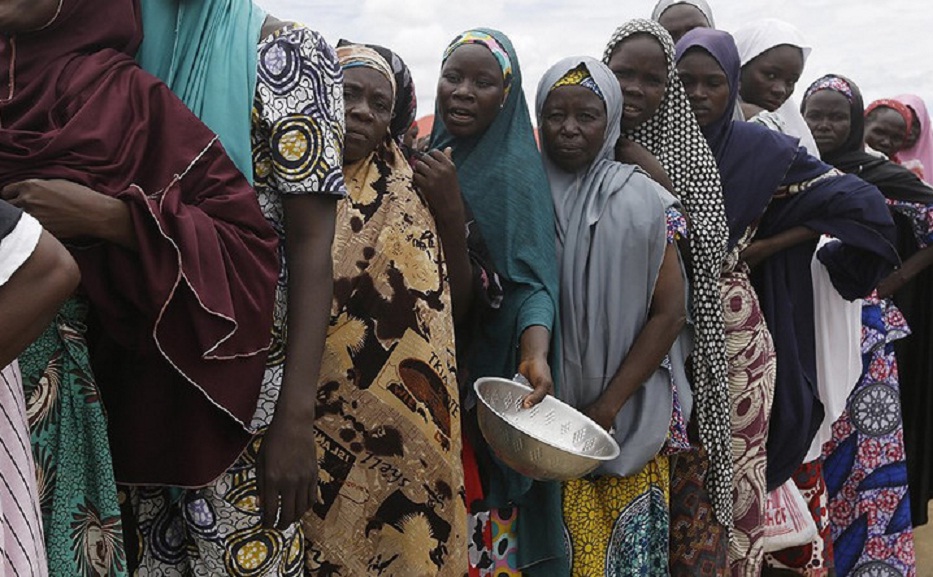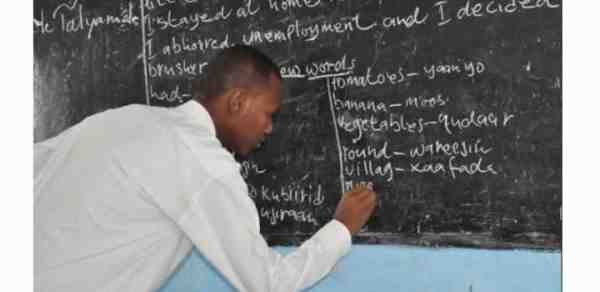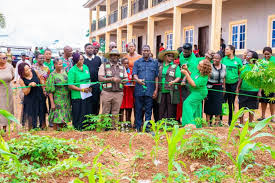Uncategorized
When the Bell Tolls on Nigerian Economy

By Mahmud Mustapha
In the past few weeks, alarm bells have been ringing about the danger facing the Nigerian economy. These alarm bells cannot be said to be frivolous or borne out of partisan inclinations because they are coming from tested economists and those who know about how well-run economies look like.
The most recent is by the Emir of Kano, Lamido Sanusi Lamido, a renowned banker who rose to become Governor of the Central Bank of Nigeria.
Speaking at a Workshop on National Treasury in Abuja, the traditional ruler and economist unequivocally said that the country was heading towards bankruptcy if the Buhari administration failed to stop fuel and electricity subsidy.In the same vein, the respected Invest Africa magazine has also drawn attention to Sanusi’s warning about Nigeria’s imminent bankruptcy, even when some people said he had denied the statement. Sanusi is not the type of man who denies statements credited to him. Even if he denied it, it should be noted that these concerns are no fluke as the high level of borrowing and debt servicing embarked upon by the Buhari administration should be a source of great worry about the future and health of the nations’ economy in any place where a genuine democracy is in place. The fact that Buhari’s pseudo-democratic government has conquered other organs of government which should normally be independent as provided by the constitution, gives cause for deep concern.
The way things stand now in Nigeria, a silent fear has gripped majority of Nigerian intellectuals, technocrats and political leaders that they might come under the hidden monitoring camera of the regime if they dare say the truth about the Nigerian condition.
The economic condition of the majority of Nigerians is currently very bad. Statistics from reputable foreign economic monitoring bodies like the Austria-based World Poverty Clock has it that a whopping 93.8 million Nigerians, as at June 2019, suffer from extreme poverty and that about six Nigerians fall into damning poverty every six minutes. On its own part, the National Bureau of Statistics (NBS) puts the country’s unemployment rate at 23.1 per cent, under employment at 20.21 per cent and youth unemployment at 55.4 per cent.
The above indices show that many Nigerians notably the young and educated population is battling with poverty. It was not long that Nigeria became the laughing stock of the World when in 2018, the World Bank and other multilateral institutions declared the country as the World poverty capital thus sounding another alarm bell for Nigeria’s political leaders.
It should be stated that these poverty indices became prevalent under the administration of President Buhari who took more than six months to put a cabinet in place after he emerged victorious in the 2015 elections. President Buhari’s lack of foresight and passable knowledge of economic issues, in the view of many experts and observers was the main reason for the recession that hit Nigeria in 2016, the first time since independence that the nation’s economy would be in such a mess. Granted that the excesses of the Goodluck Jonathan administration contributed to the economic difficulties the country faced after Buhari took over in 2015, the poor policy choices and outright lack of choice under Buhari’s watch, made economic recession and creeping poverty inevitable.
It was in this condition of recession hangover, continuing corruption in the government and the continuing burden of fuel subsidy that the 2019 polls came. Faced with enormous hardship under Buhari, the majority of the Nigerian people reasoned that voting out the lackluster administration of President Buhari was the way to put a stop to the relentless march of poverty and social dislocation in the country.
The APC and Buhari claimed victory in that election against the postulation of many analysts before the polls. The management of the Independent National Electoral Commission (INEC) whose uncertain and indecisive public posture on issues arising from the collation of results at the Presidential Election Tribunal also sided with Buhari and his party’s’ claim. However the INEC’s shifty position on the Server issue has convinced many Nigerians that much still needs to be straightened out about the conduct of that election and the declaration of a winner. The final report of European Union election monitors on the conduct and outcome and the nationwide violence that attended the election proper, points to the fact that the opposition Peoples Democratic Party (PDP), and its presidential candidate, Atiku Abubakar have a strong and genuine case before the Judiciary. It is the view of many Nigerians that Atiku Abubakar, who promised to make Nigeria work again by providing millions of jobs and providing an enabling environment for entrepreneurship to blossom won the 2019 polls and that the judiciary has a duty to tell the world so!
The issue is that having used widespread violence and the coercive instruments of the state to hijack the 2019 election outcome, it is now a task for the nation’s judiciary, to show that it is modern, fearless and independent to reverse the outcome of that election. The judiciary owes this duty to Nigerians not only for the sake of restoring the hope of Nigerians in democracy but rescuing the nation’s economy from the hands of a man who clearly does not know how a modern economy should be run.
The poor economic history of Nigeria under Buhari’s watch, characterized by growing poverty of the population, is the result of poor leadership. President Buhari clearly lacks the knowledge, temperament and leadership to guide a team that can make an economy flourish and the people enjoy a good life.
It was for this reason that when Buhari told Nigerians at the 2019 Democracy Day celebrations that his All Progressives Party (APC) administration can raise 100 million Nigerians from poverty in a period of ten years, those who have observed him since 2015, labelled the statement as hollow. Most Nigerians hold the view that the Buhari persona, his leadership style and his pervasive nepotism and policy of exclusion, means that the president and his party, the APC can only descend people into poverty, not to lift them.
Among the reasons why the growing poverty in Nigeria persists, and might continue despite Buhari’s good intentions are first, the poor and indecisive leadership of Buhari. Second, is the nationwide security problem, violence and killings which has dislocated many Nigerians. Third, is the problem which herdsmen pose to the farming population in the country that has uprooted millions of farmers from their farmlands mostly in the Northern part of the country. Food shortages are more than likely all through Buhari’s four year tenure till 2023, if the judiciary does not rescue the nation from his vice grip by declaring the rightful winner of the 2019 elections. President Buhari has shown that he lacks the will to deal with the problem of insecurity, more so when his military commanders blame everyone except themselves for the security problems in the country including Boko Haram insurgency in the North east region of the country. The insecurity issue has emerged as a disincentive to domestic and foreign investment. Four, the country’s huge population is another factor. With a population today, at 200 million and projected to rise to 400 million around 2050, the nation will be in a messy situation if it does not solve its leadership, social, infrastructural, educational and health delivery problems which are becoming critical by the day. President Buhari is not the type of man to put in place and implement a credible and effective population policy to help ensure that the country can manage its population.
Part of the solution to the poverty problem is the practice of true federalism under which the Federal Government, the States and local government will be responsible partners with each level of government working hard to eradicate poverty among the people under its care. Unfortunately, President Buhari does not believe in true Federalism compared to the opposition candidate in the 2019 polls, Atiku Abubakar who is a disciple of Federalism and who has taken pains to lay out the ways and means of its implementation to free the creative and productive energies of the constituent parts of the country.
Finally, Nigeria according to commentators and agencies who are conversant with the Nigerian economy, is in dire straits. The onus is on all Nigerians with the influence to right the wrongs to ensure that the nation is placed in credible hands.
*Mahmoud Mustapha, a public affairs analyst, wrote from Bauchi.
Uncategorized
‘Lack of Teachers Stalled Academic Activities in Bayelsa for Three Years’

From Mike Tayese, Yenagoa
The people of Amatu 2 Community in Ekeremor Local Government Area of Bayelsa State, have appealed to the State government to come to their aide, saying that for the past three years their children have not been attending classes both at the primary and secondary school level due to the unavailability of teachers and corps members.
While making the appeal in Ekeremor Town, Mr.
Jerry Samasuode, a leader of the community, said they have written several petitions to the State Ministry of Education, State Universal Basic Education Board and Post Primary Schools Board to draw attention of government to their plight but no action has been taken for the past three years.He said the situation is so bad that children of the community have forgotten their academic calendar as they don’t know when schools will resume or close for holiday, and that they fear that if nothing is done urgently to save the situation their children may grow up to become a problem to society.
Explaining further, he said “about five years ago corps members used to cover up for unavailability of teachers but today they also abandoned us. Both the teachers and corps members that were posted to the community used to complain about distance and poor standard of living as excuses but today there is a road from Yenagoa to Ekeremor.
“So, today distance should not be an excuse. Concerning the issue of poor standard of living, the community made an effort by providing accommodation, food and stipends to encourage them even though that is not part of our responsibility. Yet, when they are posted to our community, they will lobby officials to redeploy them to urban cities.
“Most of the teachers who work their redeployment to urban areas, told us that they are doing so because the government does not pay them rural posting allowances, even though we made money available for them to cover up for that but they have refused to come to our community. Yet, they will say education is the bedrock of development.”
Education
ENSUBEB Executive Chairman Flags-off Agric Education Training

From Sylvia Udegbunam, Enugu
The Executive Chairman of Enugu State Universal Basic Education Board (ENSUBEB), Associate Professor Hyginus Banko Okibe has flagged off the 2022/2023 Agricultural Education training programme for head teachers, teachers, and pupils at Independence Layout Primary School, Enugu.
Professor Okibe emphasized the importance of agriculture for economic development and growth, stressing that the country’s major problem is hunger due to people not engaging in farming activities anymore.
He noted that schools should be exposed to agricultural skills and technology; he however announced that there will be an agricultural trade fair, where produce from all schools will be showcased.
The Commissioner for Agriculture and Agro Industrialisation, Dr. Patrick Nwabueze Ubru, in a keynote address, highlight the importance of agriculture, stating that without it, there will be no life.
He disclosed that 12,000 bags of fertiliser will be distributed to registered farmers in the state and noting that non-farmers will not receive farming inputs and fertilisers.
Ubru reiterated that agriculture occupies an important space in the Governor’s vision and manifesto as one of the developmental areas for reviving the economy.
He said that Enugu State has introduced dry season farming with solar pumping machines and embarked on three-cycle rice production, making it the largest producer of cassava in the country.
He further disclosed plans to establish agricultural processing industries in the three senatorial zones of the state.
Dr. Amaka S. Ngene, Executive Chairman of STVSMB and former Permanent Member of ENSUBEB, appreciated the guests and emphasized that the agricultural education training programme is child-centered, aimed at making agriculture a future career or hobby for the pupils.
She enumerated the objectives of the training, including the provision of requisite skills for self-employment.
Hon. Nwakaego Ajah, Permanent Member 3, thanked the Executive Governor of Enugu State, the Executive Chairman of ENSUBEB, and UBEC for the initiative in making Agricultural Science more practical-oriented at the Basic Schools.
She urged the learners and teachers to take the training serious and also promote their dignity in labour.
The event featured lectures on food crops, planting, and care, and the distribution of farm inputs and plants to various schools.
The highlight of the occasion was the decoration of Dr. Amaka Ngene by the Commissioner for Agriculture and Agro Industrialisation.
Uncategorized
Police Arrest 3 Suspects over Gold Theft in Abuja

The Police said they have arrested three suspects over house breaking, robbery of gold and other valuables in Abuja.
The Force Public Relations Officer, ACP Olumuyiwa Adejobi, said this during a media briefing in Abuja.
He added that the suspects were arrested following an investigation by operatives of the Intelligence Response Team (IRT).
ADejobi said further investigation revealed that the prime suspect in the case was a fish trader at the Kado fish market in Abuja.
He said the suspects had raided three houses in the Lugbe area of Abuja before getting to the fourth house where they jumped the fence and used a motor jack to expand the bars of the burglary.
Adejobi said the suspects expanded the bars of the burglary and had access into the house where they searched for items they could steal.
He said in the process, they found a safe in the house, went away with it and used a hammer and chisel to break the safe forcefully and found money, documents and gold.
“Upon the discovery, the prime suspect contacted a buyer to dispose of the items where he realised over N60 million after selling the items,” he said.
Adejobi said operatives of the IRT had also arrested 16 suspects in connection with theft and robbery of motorcycles and tricycles in Plateau.
He said the suspects, who were particularly involved in moving around at late night, picking up any tricycle parked without supervision, were arrested following credible intelligence.
The police spokesman said the suspects were also involved in moving around and stopping motorcyclists on the road while parading themselves as police officers with fake identity cards.
He said the members of the syndicate, who posed as policemen and accused motorists of late night movement, were engaged in confiscating motorcycles and telling them to go to the nearest Police Division to retrieve the motorcycles.
He said the suspects had so far stolen several motorcycles which they had sold to the receiving group in their syndicate.
Adejobi said police operatives had recovered eight motorcycles and 11 tricycles from the suspects.
He said police operatives had in the past six weeks arrested a total of 1,284 suspects over the offences of armed robbery, kidnapping, rape, homicide, cultism and other criminal offences.
Adejobi said 307 of the suspects were arrested over armed robbery, 296, kidnapping, 301, homicide, 176, rape and defilement, and 204, cult related offences.
The police spokesman said 284 firearms, 6702 ammunition of various calibres, 107 vehicles were recovered from the suspects while 97 kidnap victims were rescued during the period under review. (NAN)















